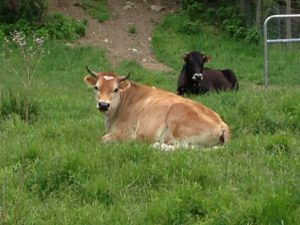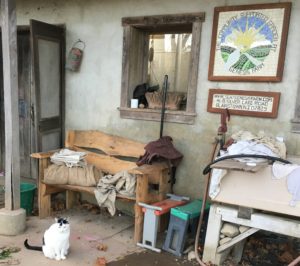Hello Fellow Lovers of All Things Green,
As we ready our gardens for the new season of growth, many add fertilizers and other nourishment such as compost and manure. You’ve likely noticed I advocate organic practices so we all may breathe green with a splash of color– honoring the health of our dear Earth.
The origin of organic farming.
Organic farming became known as such in the 1940s, soon after chemical companies introduced chemical alternatives, and folks began to notice the negative impacts on health and our environment. We farmed for thousands of years before the use of chemicals. Hence, one could say organic farming is indeed traditional farming. Farmers such as my Grandpa worked off the land, which became an autonomous ecosystem; the manure from livestock fed from the plants grown on the farm cycled nutrients back into the soil.
Scientist and philosopher Rudolf Steiner (1861-1925) concluded long before our contemporaries that we’d gradually destroy the Earth if we don’t understand the relationship between the spiritual and physical world. Steiner recognized the spiritual side of our universe and our planet, which inspired his concept of “anthroposophic agriculture,” which later became known as the biodynamic method in agriculture. In 1924, Rudolf Steiner gave a series of lectures to farmers and citizens from six countries who noticed a decline in soil conditions, crop quality, and livestock health due to chemical fertilizers. These lectures were published, and biodynamic farming was born.
Biodynamic farming improves health and well-being.
Biodynamic farming is about improving the health and well-being of humanity, animals, and crops. Methods include crop diversification and crop rotation. And avoidance of chemicals. Rather, fertilizing with outputs from the farm itself, such as fermented manure, minerals, herbs, and decaying remnants from crops. Essentially, it’s traditional farming with a spiritual and astrological focus, planting and harvesting in conjunction with earthly and planetary influences. For example, tides are highest during the new and full moons, when the sun and moon are aligned with the Earth. Just as the moon pulls the ocean’s waves, it causes moisture to rise, encouraging growth.
Biodynamic farming became the basis of Community Supported Agriculture in North America in the 1980s. Consumers and farmers work hand in hand, honoring the health of our Earth using organic practices while being socially responsible to the community it serves.
“It’s about more than just vegetables.”
One of our local community-supported gardens is Genesis Farm in Blairstown, NJ. “It’s about more than just vegetables,” their website touts, “the direct link between members and farmers puts the ‘culture’ back in ‘agriculture.’ As a result, our community begins to reconnect to the Earth and each other.”
Garden Dilemmas? Askmarystone@gmail.com and your favorite Podcast App.

A farm field of Queen Anne’s Lace serves as a cover crop.




